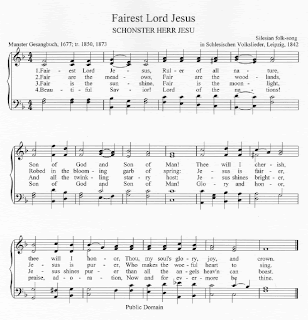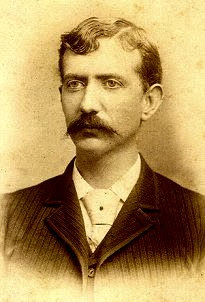Monday, February 27, 2012
Wonderful Grace of Jesus
Wonderful grace of Jesus,
Greater than all my sin;
How shall my tongue describe it,
Where shall its praise begin?
Taking away my burden,
Setting my spirit free;
For the wonderful grace of Jesus reaches me.
Refrain
Wonderful the matchless grace of Jesus,
Deeper than the mighty rolling sea;
Wonderful grace, all sufficient for me, for even me.
Broader than the scope of my transgressions,
Greater far than all my sin and shame,
O magnify the precious Name of Jesus.
Praise His Name!
Wonderful grace of Jesus,
Reaching to all the lost,
By it I have been pardoned,
Saved to the uttermost,
Chains have been torn asunder,
Giving me liberty;
For the wonderful grace of Jesus reaches me.
Refrain
Wonderful grace of Jesus,
Reaching the most defiled,
By its transforming power,
Making him Gods dear child,
Purchasing peace and heaven,
For all eternity;
And the wonderful grace of Jesus reaches me.
Refrain
Saturday, February 25, 2012
Fairest Savior
Jesus is fairer, Jesus is purer Fairer and purer are used here for emphasis. Similar words are used in poetry to give impact.Merriam-Webster's dictionary solidified my understanding. It defines fair as, "pleasing to the eye or mind especially because of fresh, charming, or flawless quality."
 Think of the "fairest of the fair". The beauty queen. The best of all of the beautiful women. Fresh, charming, flawless. The second stanza reads:
Think of the "fairest of the fair". The beauty queen. The best of all of the beautiful women. Fresh, charming, flawless. The second stanza reads:Jesus is fairer, Jesus is purer who makes the woeful heart to sing. That's what the hymn's author chose to call Jesus. He is flawless, our perfect Savior.1 Peter 1:18-20 says:
18 For you know that it was not with perishable things such as silver or gold that you were redeemed from the empty way of life handed down to you from your ancestors, 19 but with the precious blood of Christ, a lamb without blemish or defect.
At Passover, the Jewish people were required to slaughter a perfect lamb, one "without defect" (Exodus 12:5), and sprinkle that blood on their doorposts. Then the Angel of Death wouldn't visit them. They would be saved from certain death.
That's what our Perfect Sacrifice did for us. Jesus, the fairest, offered Himself as our sacrifice and saved us from certain death. If He wasn't the fairest, the perfect one, His sacrifice wouldn't have been acceptable to God. The Passover in Exodus foreshadowed our Fairest Savior's death on the cross.
Verse four gives a wonderful response to this news:
Beautiful Savior! Lord of all the nations!Amen and amen.
Son of God and Son of Man!
Glory and honor, praise, adoration,
now and forevermore be thine.
Thursday, February 23, 2012
The Story Behind Fairest Lord Jesus

I have to say, I'm a little surprised at how old this hymn is. For some reason, I thought it was rather new, perhaps late 19th century or even early 20th century, but some traditions say it's as old as the 12th century, sung when Crusaders made their way to the Holy Land. Originally, some believe, it was sung to a Gregorian chant. None of that can be substantiated.
Others attribute the hymn to around 1620, when the followers of the reformer John Hus were driven from Bohemia in a bloody purge. They settled in Silesia, now part of Poland. This is said to have been a Bohemian folk song.
The first known appearance of the hymn was in the Roman Catholic Munster Gesangbuch of 1677. Hoffman Fallersleben heard a group of Silesians singing this hymn, wrote down what they sang, and published it in his Schlesische Volkslieder in 1842. This is the version of the hymn we know.
The hymn appeared in English in Richard Storrs Willis' Church Chorals and Choir Studies in 1850.
 A notation about this hymn in that collection stated that it was, "sung by the German knights on the way to Jerusalem." That may well be where the Crusader legend began. Willis was also the composer of It Came upon a Midnight Clear.
A notation about this hymn in that collection stated that it was, "sung by the German knights on the way to Jerusalem." That may well be where the Crusader legend began. Willis was also the composer of It Came upon a Midnight Clear.
Monday, February 20, 2012
Friday, February 17, 2012
New Every Morning

When I was a child and upset at night about what happened during the day, my mother often told me, "Things will look better in the morning." She was right. Day dawned and things weren't as bad as I had imagined them.
Thomas O. Chisholm understood this when he wrote Great Is Thy Faithfulness. The hymn is based on Ecclesiastes 3:22-23:
Because of the LORD’s great love we are not consumed,
for his compassions never fail.
They are new every morning;
great is your faithfulness.
Just who is this God on whom we depend? He's not fickle - he's faithful. Completely faithful. We may have faithful friends, but they aren't beside us 24/7. They can't perfectly understand everything we are going through and can't always work problems out for us. God can. And He does.
Great is thy faithfulness, O God my Father;
there is no shadow of turning with thee;
thou changest not, thy compassions, they fail not;
as thou hast been thou forever will be.
Every morning His mercies are new for us. Corrie ten Boom, a Dutch woman who spent time in a Nazi concentration camp for hiding Jews, told a story her father told her when she was worried. He asked her when he gave her the ticket for the train. She answered that he gave it to her right before she needed it. Her father compared that to God - each new morning, just when we need it, He will provide whatever we require. What a wonderful analogy.
Summer and winter and springtime and harvest,
sun, moon and stars in their courses above
join with all nature in manifold witness
to thy great faithfulness, mercy and love.
Whenever the sun rises, whenever the seasons change, whenever the birds sing in the trees, that is a testament to God's faithfulness to his promises. As children, we're told not to make promises you can't keep. We're human and we don't always keep our word. God always does. Look out your window and remember how much He loves us.
Pardon for sin and a peace that endureth
thy own dear presence to cheer and to guide;
strength for today and bright hope for tomorrow,
blessings all mine, with ten thousand beside!
Of course, the greatest promise He kept was to send His son to die for our sins. He has vowed to give us eternal paradise.
For my Father’s will is that everyone who looks to the Son and believes in him shall have eternal life, and I will raise them up at the last day. John 6:40
He will be faithful to that promise. What a wonderful assurance that is.
Wednesday, February 15, 2012
The Story Behind Great Is Thy Faithfulness
 He became a pastor at the age of 36 but had to retire a year later because of poor health.
He became a pastor at the age of 36 but had to retire a year later because of poor health.He was able to take missions trips, and while away, he wrote his friend, William Runyan, a little known composer. Thomas often included poems in these letters Runyan was so moved by one of the poems, he wrote the music to the hymn we now know as Great Is Thy Faithfulness. It was published in 1923.
George Beverly Shea began to sing it at the Billy Graham crusades and the hymn became popular.
Thomas Chisholm became a prolific poet, writing over 1200 poems in his long lifetime. He died in 1960.
Monday, February 13, 2012
Great Is Thy Faithfulness
Friday, February 10, 2012
Hungering for More about Jesus

Jesus said, "Blessed are those who hunger and thirst for righteousness, for they will be filled." Matthew 5:6.
Too often we rush through Bible reading. There are other things to be done - kids off to school or activities, dinner to be made, bills to be paid. Daily Bible reading slides to the bottom of the list. It gets forgotten in the hustle and bustle of our busy modern world.
We don't function well if we go an entire day without food or water. By the end, we're weak, exhausted, and in need of sustenance. And we fill that need by going to the refrigerator or the pantry.
If we don't spend time each day in God's word, meditating about what he says to us and reveals to us in the Bible, we grow weak and exhausted. Plodding along in our Christian life is difficult. We fall further and further behind in our race to the end.
We need sustenance.
The only place to get it? In God's word. May this be our prayer:
More about Jesus would I know,
More of His grace to others show;
More of His saving fullness see,
More of His love Who died for me.
Refrain
More, more about Jesus,
More, more about Jesus;
More of His saving fullness see,
More of His love Who died for me.
More about Jesus; in His Word,
Holding communion with my Lord;
Hearing His voice in every line,
Making each faithful saying mine.
Thursday, February 9, 2012
The Story Behind More about Jesus
Could she have been bitter? Certainly. Could she have complained to God about the unfairness of it all? None of us would have blamed her if she did.
But the truth is, she didn't. From her bed, she studied English literature and began to sing and write.
She took this time to learn more about Jesus. This was her prayer to her Lord, that he open her eyes so she would see more of Him and reflect more of Him.
More of His holy will discern;
Spirit of God, my teacher be,
Showing the things of Christ to me.
Some of her poems became known to Professor John R. Sweeney, who set them to music.
Eliza's back condition improved and she was able to resume some of her duties, though she struggled with pain the rest of her life. She became Sunday school superintendent of the Northern Home for Friendless Children and later at Calvin Presbyterian Church. She died in 1920.
Monday, February 6, 2012
More about Jesus
Saturday, February 4, 2012
Crown Him Lord of All

 When Jesus ascended to heaven, God crowned Him, exalting Him to the place of honor and glory He earned by dying in our place.
When Jesus ascended to heaven, God crowned Him, exalting Him to the place of honor and glory He earned by dying in our place.But we do see Jesus, who was made lower than the angels for a little while, now crowned with glory and honor because he suffered death, so that by the grace of God he might taste death for everyone. Hebrews 2:9
If only we could have been in heaven on that glorious day! Imagine the pomp and circumstance then.
All hail the power of Jesus' name!Do Christians forget about Christ's kingship? We understand and emphasize the fatherly love God has for us, and rightly so. He tells us to come to Him as a child comes to his father. But do we stand in awe of the Lord and remember with wonder what he has done for us? He suffered in our place, took our sin, bore God's wrath and triumphed over death. Because of this, we have confidence that on the day of judgement, we will be declared righteous and will not have to suffer the consequences of our sin. What a truly glorious thought.
Let angels prostrate fall;
bring forth the royal diadem,
and crown him Lord of all.
Sinners, whose love can ne'er forgetOur glorious God humbled himself to the point of death and afterwards received the reward prepared for him.
the wormwood and the gall,
go spread your trophies at his feet,
and crown him Lord of all.
6 Who, being in very nature God,
did not consider equality with God something to be used to his own advantage;
7 rather, he made himself nothing
by taking the very nature of a servant,
being made in human likeness.
8 And being found in appearance as a man,
he humbled himself
by becoming obedient to death—
even death on a cross!
9 Therefore God exalted him to the highest place
and gave him the name that is above every name,
10 that at the name of Jesus every knee should bow,
in heaven and on earth and under the earth,
11 and every tongue acknowledge that Jesus Christ is Lord,
to the glory of God the Father. Philippians 2:6-11
As if that weren't enough, his death purchased crowns for each of us on the last day. When that time comes, everyone who has ever lived, everyone of every race and culture and language will fall at his feet and acknowledge His kingship over us.What a glorious day that will be.
Imagine the rejoicing in heaven as all of God's people gather in His throne room and praise Him for all He has done for us. The human mind can't begin to comprehend what it will be like. Take the coronation of an earthly king and multiply it infinitely and you'll get the idea.
Those the LORD has rescued will return. They will enter Zion with singing; everlasting joy will crown their heads. Gladness and joy will overtake them, and sorrow and sighing will flee away. Isaiah 51:11
O that with yonder sacred throng
we at his feet may fall!
We'll join the everlasting song,
and crown him Lord of all.
We'll join the everlasting song,
and crown him Lord of all.
Wednesday, February 1, 2012
The Story Behind All Hail the Power
Edward knew hardship and persecution. He was friends with the Wesleys for a while, but a rift developed between them over theology and Edward spent the rest of his days ministering to a small Congregational church.
Both of the most popular tunes, Coronation and Diadem, were written by nineteen-year-old young men. Oliver Holden, a Boston musician, wrote Coronation in 1793 just for All Hail the Power. John Ellor, and Englishman, wrote Diadem in 1838. The original tune is was set to, Miles Lane, appeared with the first version of the hymn and was written by William Shrubsole. You can listen to that music here.
The story goes that missionary to India P.E. Scott went to a remote tribe and was soon surrounded by warriors, spears drawn. Knowing his death was near, he took out his ever-present violin and began to sing the hymn in their native language. When he looked up from the final verse, the warriors had lowered their spears and many were in tears. Needless to say, he survived and went on to serve that tribe for many years.
